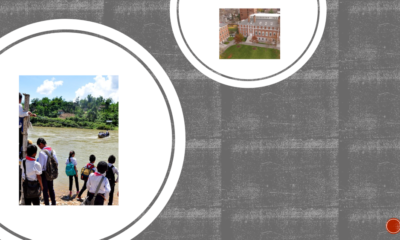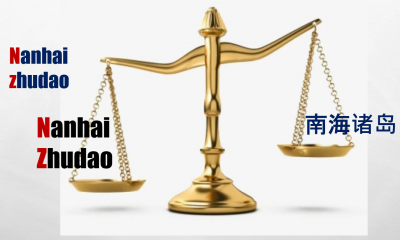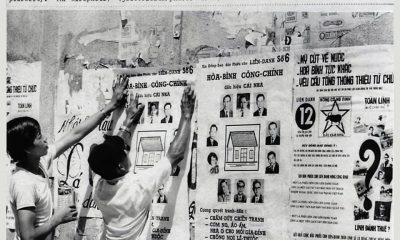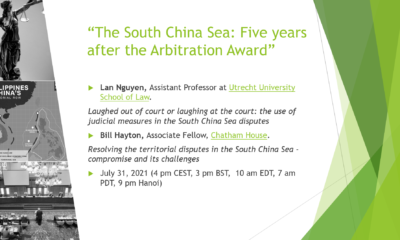Sarah Bregman and Nguyen Phuc Anh
COVID-19 Arrives in Hanoi
As a global problem with local consequences, pandemics require international cooperation to solve. Moral chasms, however, hinder efforts to prevent the spread of infectious disease.
COVID-19 arrived in Hanoi on Monday, March 2nd on a flight that departed from London with just over 200 passengers.
Just before official news broke confirming Vietnam’s 17th case of COVID-19 on the night of March 6th, personal details identifying patient 17 went viral. Concerned citizens circulated pictures of police blocking Trúc Bạch street, in one of the wealthiest areas of Hanoi, warning that the “announcement would go up soon.”
Anger and shock fueled the rapid spread of facts, rumors, and accusations across social media platforms. Fear and panic spread with the rumor that patient 17 had appeared at the UNIQLO opening event. Coincidentally, the public had mistaken patient Nguyễn with a student at Diplomatic Academy of Vietnam, leading several students to publicly rush to her defense on Facebook.
The next day internal documents and records circulated with the names of 17 (later 20) exposed doctors and medical staff at Hồng Ngọc Hospital, where Nguyễn received a positive diagnosis. It became clear, however, on March 8th, that the virus had not been carried to Vietnam as the result of one rich girl’s poor judgment. One quarter of the passengers sitting in the VIP section (8 of 21) and six passengers from economy class also tested positive for COVID-19 before the weekend was over.
Among those infected was the Vice Chairman of the Central Theoretical Council of the Communist Party of Vietnam and Former President Vietnam Academy of Social Science (VASS), Nguyễn Quang Thuấn. As a member of the advisory team for the prime minister, Nguyễn directly or indirectly exposed 400 intellectuals and staff at VASS and other government institutions in just one week after returning to Vietnam from London.
The Vietnamese government and local authorities took various measures to identify the remaining passengers on flight VN54. A VASS employee, who has asked not to be identified, leaked a list identifying foreign passengers aboard flight VN54. The confidential list briefly circulated on social media and revealed the names, nationalities, and temporary lodging of 149 passengers. It was clear now that the majority of passengers aboard Flight VN54 were British travelers between the age of 50 and 70. A second list circulated exposing the names, phone numbers, departments, and even home addresses of nearly 400 people with direct or indirect contact with Nguyễn Quang Thuấn.
The Vietnamese government issued strict, proactive measures to combat the spread of COVID-19. The most notable example is the use of a four-round protocol, described on the Ministry of Health news website, to determine levels of exposure requiring quarantine or isolation. Anyone who directly contacts an infected person is classified as “round one.” Of note, round one automatically extends not only to the infected person but to all members of his household. Round two, or “concentrated quarantine,” applies to anyone outside the household who contacted persons in round one quarantine. Round three permits households to self-isolate at home after one or members of that household contacted persons in round two quarantine. The Vietnamese system is unique, because containment measures are applied not only to one infected individual but to entire households.
Using this protocol, authorities located any person who contacted Nguyễn Quang Thuấn in the previous week and placed 116 in round one quarantine and an additional 324 in round two concentrated quarantine. The government additionally announced strict laws punishing any person who is exposed to COVID-19 and withholds information from authorities. The Vietnamese government is actively investigating the case of Patient 17, who a group of lawyers contend withheld vital information from the public. The government further released a warrant for a missing British citizen, a passenger on flight VN54, requiring he appear for immediate round one quarantine.
The Vietnamese government has taken additional measures to support and care for suspected or confirmed COVID-19 patients. At a March 11th Hanoi People’s Committee meeting, members of the Hanoi People’s Committee agreed to adopt measures to test 100% of suspected COVID-19 cases and to offer economic support to afflicted patients. This contrasts markedly with the testing and treatment programs of the United States and United Kingdom, which have been widely criticized for their public health response.
Typically, patients diagnosed with infectious diseases in Hanoi are sent to a hospital in Dong Anh, a northern district of Hanoi, where there are 1,000 hospital beds available for infectious disease patients. Due to the overwhelming number of residents undergoing preventative screening and quarantine measures, however, the Hanoi Department of Health additionally issued decision 969/SYT-NVY on March 5th, 2020, designating six facilities at military bases in Hanoi to screen and test recent travelers before sending them on to regional hospitals for treatment.
These incidents highlight moralities surrounding rights and responsibilities during pandemics. Is it right or wrong to share private details of patients suffering from an infectious disease to warn the public? Should foreign travelers be held to the same moral and cultural standards as locals? Should wealthy people restrict their own mobility and privacy to protect the health of those with fewer financial resources who may not be able to access care or take leave from work?
It’s My Right! Moral Experiences of Pandemics
Worldwide, many have cried out against government measures to control the spread of COVID-19. Experts on all sides of the political spectrum blame governments for infringing on rights to individual privacy or mobility while simultaneously demanding fast and accurate information, transparency, and accountability. The more difficult problem, it seems, for effective local and international response is coming to an agreement about and defining moral standards for health emergencies.
Quarantines, travel restrictions, and collecting and sharing personal information have all been framed as rights violations in countries with an active COVID-19 outbreak. In Italy, the quarantine of more than 60 million people has raised concerns about the rise of authoritarian rule and the abuse of state power, while critics challenge the efficacy of “draconian measures.” Yet, even the UN High Commission took a moderate position, acknowledging the importance of quarantines in public health. In a statement to the press, he clearly stated: “Lockdowns, quarantines and other such measures to contain and combat the spread of COVID-19 should always be carried out in strict accordance with human rights standards and in a way that is necessary and proportionate to the evaluated risk.” But, discussions of human rights and COVID-19 often neglect to consider the local cultural and economic contexts in which human rights practices are embedded.
Beyond material limitations, such as political and economic restrictions placed on the global distribution of medical supplies, purportedly universal rights are embedded and practiced in “local moral worlds.” American physician and professor of medical anthropology at Harvard University, Arthur Kleinman introduced the insightful concept of “local moral worlds” in his poignant book What Really Matters in an effort to make sense of the life and death decisions families in China made when caring for family members dealing with illness. Having both personal and professional experience caring for his wife at the end of her life and working as a Barefoot Doctor in China, Kleinman reminds us all that local risks, uncertains, and dangers create particular moral questions. Culture is what helps guide us in making the right decision.
The interaction between locals and foreigners in international labor markets has made cultural and moral differences increasingly evident as workers or travelers knowingly or unknowingly expose locals to a virus.
In Vietnam severe tensions arose when Vietnam quarantined a plane full of Korean travelers. Korean passengers accused Vietnam of treating Korean travelers poorly, while Vietnamese netizens initiated a social media shame campaign under the Twitter hashtags #KoreaStopLying and #ApologizeToVietNam. Vietnamese netizens accused Korean travelers of lying about the care they received in Vietnam and demanded a formal apology.
Tension also grew between Vietnamese and foreign residents in Hanoi because of different understandings and beliefs surrounding the morality of wearing masks in public. Foreign residents frame their experiences in terms of stigma and discrimination, while Vietnamese residents lament that foreigners from wealthier countries are “unethical” and “selfish.”
One American resident, John Hetherington, currently living in Danang, expressed his concern over the disagreement. In a personal message he told me that he feels the disagreement “certainly seems to be getting worse rather quickly.”
An online group discussion between members of a popular Facebook group “Expats Living and Working in Vietnam” revealed some of the issues at the heart of foreigners’ unwillingness to wear masks. Foreign residents’ beliefs were generally related to doubts about mask technologies or concerns that medical workers would be placed at risk if the general public used masks for personal use. One user, under the alias Jonni Oliveras, defended science, asserting: “This is well documented. You should wear a mask if you are already sick as it can help to prevent spreading it.” He did stress, however, that when healthy people wear “paper surgical masks” it is largely “symbolic” and has little effect on preventing the spread of infectious disease.
Discrimination, racism, and xenophobia are terms that are now loosely and widely used to explain these incidents, suggesting among other things that these moral conflicts are inevitable and impossible to resolve. Inter-racial violence against Asian residents abroad or against Chinese residents in Korea are frequently cited in progressive media, leading some concerned professionals to warn against xenophobic or closed-border policies. Critics of closed-border policies argue that access to medical care is a universal right that should be protected for people regardless of the nationality, race, or residence status of individuals. Yet, overstating racial or ethnic sources of conflict in Asia risks making racism an inevitable, inescapable social fact and overlooks or dismisses moral and cultural concerns about access to and distribution of medical resources in East Asia that guide decision-making during health care emergencies.
Moralities in the East and West: Individual Freedom or National Responsibility
Differences in moralities and beliefs about good governance have emerged as an important challenge to local efforts to contain COVID-19. As European and American idealists raise concerns that closing borders and restricting travel is discriminatory and infringes on the rights of individuals to protect themselves from infectious disease, East Asian leaders worry more about shortages in medical resources needed to save the lives of people for whom they feel morally responsible. Euro-American moralities appear to center on protecting individual freedom, autonomy, and dignity, while East Asian moralities are concerned with responsibility to and care for the nation.
Idealistic liberal ideologies stressing freedom and personal choice are nonsensical for many in East Asia because of the material consequences, including loss of life, for vulnerable groups without a choice. Political economy, Marxism, and disdain for human rights ideology persist in East Asian academic and political culture precisely because of these moral concerns attached strongly to subjective memories of collective tragedies.
Experiences with foreigners were far from peaceful in the history of international relations in East Asia. Gunboat diplomacy characterized foreign policy in East Asia in the late 19th and early 20th century, beginning with the 1854 Treaty of Kanagawa between America and Japan. Rather than improving relations between nations, as proponents of free trade and liberalism often espoused, Western European and American economies initially grew richer as Asian economies suffered from seemingly endless famine, poverty, and war. Political tensions grew worldwide, ultimately leading to violent uprisings as East Asian nations fought for independence and sovereignty. It was notably in the midst of this hectic time in international history that the Spanish Flu of 1918 ravaged the globe, infecting one-third of the population and killing an estimated 50 million people worldwide.
Now, as COVID-19 ravages East Asia, leaders are once again concerned with carefully producing and saving medical resources and food to take care of the health of their nations. This is evident in bans on travel and exports of medical supplies across East Asia. Ironically, what most in East Asia view as moral responsibility and good governance, many liberal academics and policy-makers will denounce as ethnonationalism or authoritarianism.
Moral chasms such as these have attracted overwhelming interest in anthropology in the last several decades. Studies of morality in anthropology have questioned the universality of international human rights. Anthropologist Laura Nadar calls human rights a form of “moral imperialism,” while Anthropologist Saba Mahmood highlighted how human rights is used to perpetuate rather than alleviate state violence. New approaches in anthropology stress the importance of local histories and related emotional experience and memory.
It is fairly clear that insisting upon a universal moral standard hinders rather than helps international cooperation. It seems, however, that in a global era resolving moral disputes and preventing the spread of infectious disease must start not with imposing a comprehensive moral system, but with a focus on understanding the various meanings and possible interpretations of each and every item listed on the international charter of human rights.
The rise in international trade, technology, and travel has not erased cultural differences or replaced local moral traditions with universal human rights, but it has made the need for tolerance and understanding of and respect for local moralities more important than ever.
Sarah J. Bregman is an anthropologist, consultant, and educator working in Korea and Vietnam. Currently, she is an international program director and expert consultant at Nguyen Binh Khiem High-Quality Education System, a lecturer at the Diplomatic Academy of Vietnam, and the regional director of The Asia Institute, Vietnam. She has publications in English and Vietnamese, analyzing migration between North and South Korea, international relations, neoliberalism, citizenship, and human rights. Bregman graduated from Harvard University with a master’s degree in Regional Studies, East Asia in 2015, and went on to complete three years of graduate coursework in anthropology and Korean at Seoul National University before expanding her field to Vietnam in 2018. Email: sarahbregman@dav.edu.vn and sbregman@asia-institute.org
Nguyen Phuc Anh has worked as a lecturer of Sino-Nom studies at the College of Social Sciences & Humanities, Vietnam National University-Hanoi since 2009 after receiving his bachelor’s degree in Sino-nom Studies and advancing as a doctoral candidate in the department. Nguyen was a visiting fellow at the Harvard-Yenching Institute from 2015-2016. He received a Ph.D. in social anthropology at Tokyo Metropolitan University in 2018. His current research interests include the history of family in Vietnam, emergent technologies, neoliberalism, and Sino-Nom. Email: anhnp@vnu.edu.vn

 Politics & Economy3 years ago
Politics & Economy3 years ago
 ARCHIVES4 years ago
ARCHIVES4 years ago
 Politics & Economy3 years ago
Politics & Economy3 years ago
 Politics & Economy4 years ago
Politics & Economy4 years ago
 Politics & Economy3 years ago
Politics & Economy3 years ago
 Politics & Economy4 years ago
Politics & Economy4 years ago
 ARCHIVES3 years ago
ARCHIVES3 years ago
 Politics & Economy3 years ago
Politics & Economy3 years ago





